#steven moffat could never
Explore tagged Tumblr posts
Text
My pet peeve with how people talk about that line in here is that while everyone fails to plug in a phone sometimes, who the fuck actually does it enough to leave marks on their phone?? I don't even know if it's possible, but you would have to fuck it up all the time to scratch it, not just the normal amount. If you miss the port once, BBC Sherlock is not judging you yet
What annoys me the most about that scene though is why would someone get an engraving on a phone? And ofc the Doylian reason is because they're taking it from the original The Sign of Four novel where Holmes deduces Watson's brother had drinking problems based on his pocket watch. The whole deduction makes more sense if it's a pocket watch, especially because of how normalised drinking was back then, and how much concentration it would take to wind a watch versus just plugging in a phone charger
Here's a source I could find real quick:
AFFIRMATIONS
There is no shame in taking a few tries to get it right
Everyone struggles with fine motor skills from time to time
I can do fine motor activities
I can locate a port and plug in a cable
I can plug my phone in on the first try
I can plug my phone in while sober
BBC Sherlock does not exist
I can do hard things
#this is such an endearing little historical detail#i can imagine john's brother setting his watch every night because he knows he won't have time in the morning when he's hungover#steven moffat could never
52K notes
·
View notes
Text
as a sherlock and co fan i decided i would venture into the unknown lands of bbc sherlock
all i can say is the last thing i expected was for moriarty to be a twink that tries to flirt with sherlock
#i actually have so many thought abt bbc sherlock#i could write an essay on everything that was wrong with it/i did not like#dont get me wrong i did enjoy a lot of it tho#season four tho#...#very bbc drama lets just say that#also steven moffat co wrote it#oh god#explains why irene adler mentioned she was gay and then it was never acknowledged again#sherlock & co#sherlock and co#sherlock & co.#sherlock holmes#bbc sherlock#sherlock fandom#i actually have so many thoughts hhh
36 notes
·
View notes
Text
Moffat back at it with a rendition of his greatest hits all at once and babes we've never been so back
#doctor who#yes give me a scathing critique of capitalism and organised religion wrapped up with the belief that humanity will always prevail YES#they could never make me hate you steven moffat#you and your pretentious and earth-shattering dialogue#fifteenth doctor
8 notes
·
View notes
Text
me watching DW at any given moment: that's very pretty Moffat. please shut up
#any episode of his I SWEAR#stopppp#dw#doctor who#moffat era#moffat#moffat hate#anti steven moffat#no I don't hate him actually! I don't! I could never write like he does#but sometimes. SOMETIMES. YUCK
19 notes
·
View notes
Text
Day sixteen of “Kon meets pink kryptonite and decides to fuck Tim and his boyfriend about it” behind the cut. (( chrono || non-chrono ))
And it’s–nice, to get to feel that for a little while, so Kon just . . . feels that, for a little while. Tim feeds him a little more fruit and pets him a few more times too, and it’s . . . really, really nice. But then it starts feeling like he should be doing something for this, if Tim’s focusing on just him for once–like, keeping his attention, keeping him entertained, making him not regret spending all that time on him instead of anything more important and just earning–
“The chef sends his compliments,” Bernard announces easily as he steps back into the room and Tim looks towards him, and Kon feels the weirdest sensation of, like . . . relief, almost, and his head quiets down a little more again, and doesn’t feel so . . . full, again. Just–if Bernard’s back, he doesn’t have to try so hard to like . . . to be all those things all at once, maybe. Doesn’t need to be all those things all at once.
“Is that a latte?” Tim asks, sounding a little surprised.
“Okay, fine, the barista sends his compliments, geez,” Bernard huffs, making a face at him. He’s holding two mugs, one a big chunky red one that’s almost the size of a soup bowl and the other bright blue and almost, like, cube-shaped and covered in all these weird-looking linked and interlinked circles and lines and stuff, kinda? Kon doesn’t actually know what they’re supposed to be, but he guesses maybe it’s just an aesthetic thing?
More importantly, that’s the one that’s topped with whipped cream and a caramel drizzle, so like . . . priorities, obviously.
“Um–that blue one for me, man?” he asks, feeling a little awkward about asking, but . . . look, sue him: it smells real fuckin’ good.
“Yeah, I couldn’t resist, sorry,” Bernard says, setting both of the mugs on the nightstand next to the mostly-empty breakfast dishes. “Very on the nose, I know, but give a man his vices.”
“Uh . . . ‘on the nose’?” Kon asks, wrinkling his own in confusion.
“. . . hey Tim totally random question, how much British television am I allowed to bully your boy into watching this weekend?” Bernard asks conversationally. “Like we can go doggy style for a few rounds, right? Very on-brand anyway, considering, and then we can multitask it and also I can explain the continuity errors and why if I ever meet Steven Moffat it is on sight.”
“I dunno, I really liked that Jekyll show,” Tim says, eyeing the mug with the alleged latte with clear intent.
“Obviously, Tim, that show was incredible, but also that show limited the man to six episodes and he could not write a full season of television to save the BBC or Matt Smith’s career,” Bernard says feelingly, then reaches over and sort of–scruffs Kon’s hair more than anything else, really, and Kon’s spine goes a little bit liquid over it. “Actually, wait, maybe ‘last of his kind except for that one dude who wants to kill him’ super-powerful alien guy is, like, too on the nose, maybe that would not actually be fun and enjoyable escapism for you, hm.”
“I have no idea what you’re talking about,” Kon admits as he pushes himself up a bit, because he really does not, yeah, but also he really wants to know what that hot chocolate tastes like. Bernard very visibly just suffers.
“I’m talking about the Doctor, man, c’mon,” he says feelingly.
“Doctor who?” Kon asks in bemusement.
“. . . congratulations on being the funniest motherfucker on this boat without even trying, I will never beat that one,” Bernard sighs as Tim bursts into laughter. Kon very much does not get the joke, but like . . . there’s hot chocolate on that nightstand, so really, bigger priorities in life right now, and he eyes the mug consideringly. “Let it cool off for a minute, bud, otherwise you’re gonna burn your tastebuds off and won’t even be able to taste it, and that would be a tragic loss on your end, trust me.”
“. . . so who’s being the funniest one on the boat again?” Kon asks wryly, raising a pointed eyebrow at him. Bernard stares blankly at him for a moment, then–
“Ohhhhh,” he realizes, then laughs sheepishly as he picks the mug up himself and holds it out to him. “Yeah, have at it, big guy.”
#timberkon#konbern#timkon#timbern#kon el#conner kent#bernard dowd#tim drake#superboy#dc robin#wip: think pink#dom/sub#I actually wrote like twice this much today but uhhhhh look you'll see the rest of it in another chapter or so l o l
150 notes
·
View notes
Text
Did someone say Sherlock?
who else gets like sustained feelings of intense dislike towards characters/media that used to be your special interest at any point in the past
#bbc sherlock#johnlock#oh god i look back on those years and just flinch#not just wince flinch#i have never seen such vitriolic queerbaiting#like at least the magicians and supernatural felt like negligence that was MOSTLY without malice#but it felt like gatiss and moffat HATED the fans#would spit in our faces if they could#the writing slapped us in the face for liking MYSTERIES much less for wanting queer characters#so glad I'm done with that show but GOD#mark gatiss#steven moffat#sherlock holmes#john watson
25 notes
·
View notes
Text
Matt Smith literally never phoned in a performance as the Doctor you could have 1 million fights about Steven Moffat’s writing or 11’s personality but Matt Smith always put his whole pussy into it
287 notes
·
View notes
Text
Every Sherlock Holmes adaptation I've seen so far (BBC cough cough) has made the infuriating AMATEUR mistake of pretending like Sherlock Holmes can do All That because he is just... so special?
Meanwhile good fellow Sir Doyle wrote, I shit you not, within the TWENTY first pages of a Study in Scarlet that Sherlock Holmes believed that thought deduction was a science that could be learned but could never be perfected. He wrote articles explaining to the "common man" how to begin learning deduction and says MANY TIMES throughout the stories that his reasoning isn't really so mysterious, that it's actually quite simple and logical. (Though he is obviously extremely smart and observant in the books, not to discredit that but it's Different you know)
Anyway Steven Moffat is a coward for making Holmes an arrogant edgelord with near-magic capabilities. ACD i love you and cherish you thank you for making Holmes be not insufferable and not perfect
251 notes
·
View notes
Text
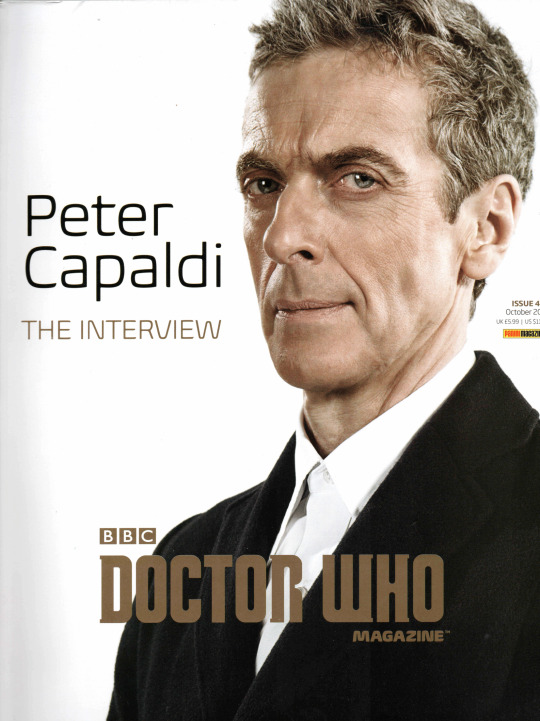
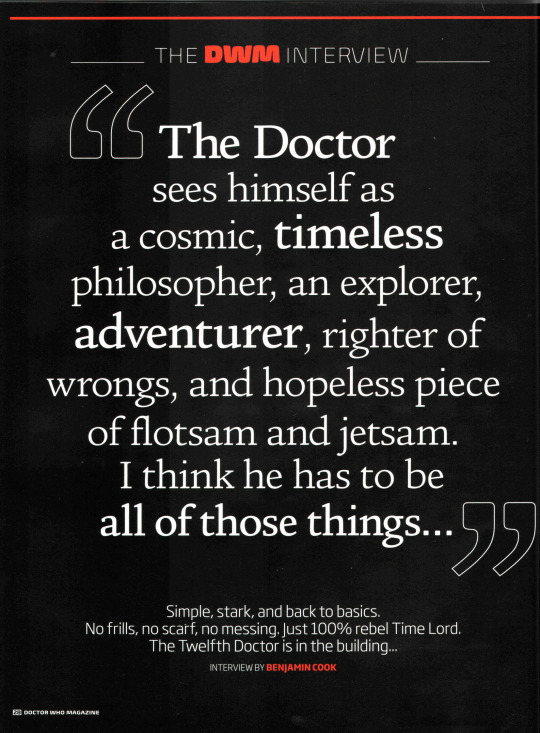
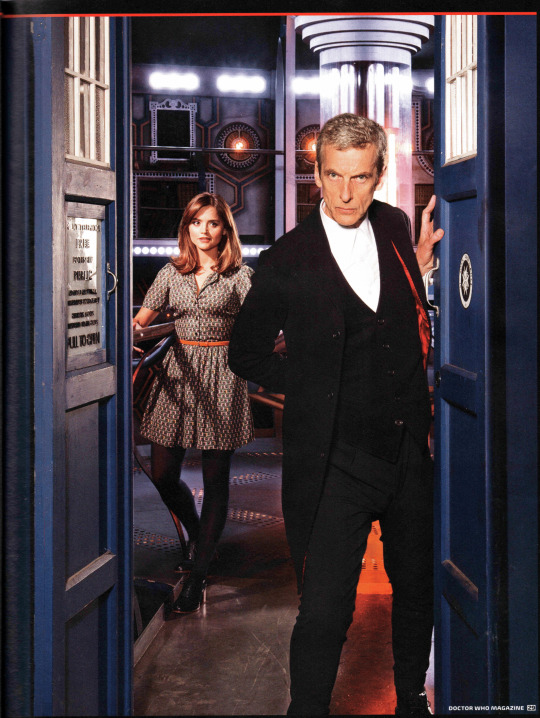
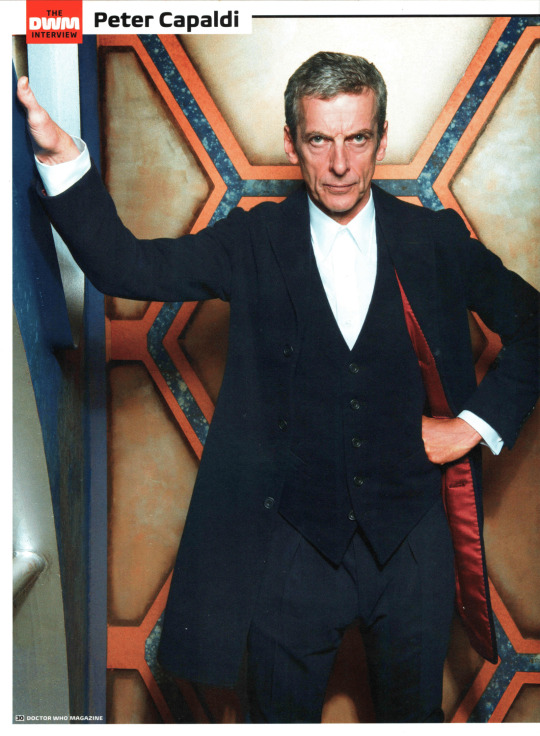
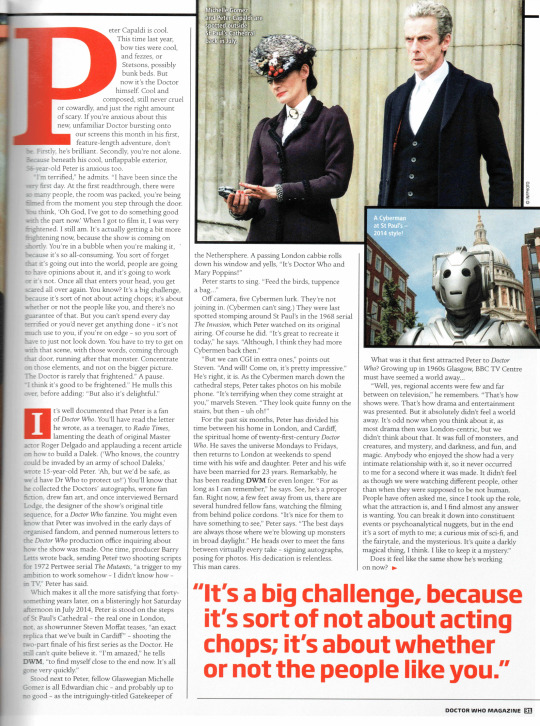
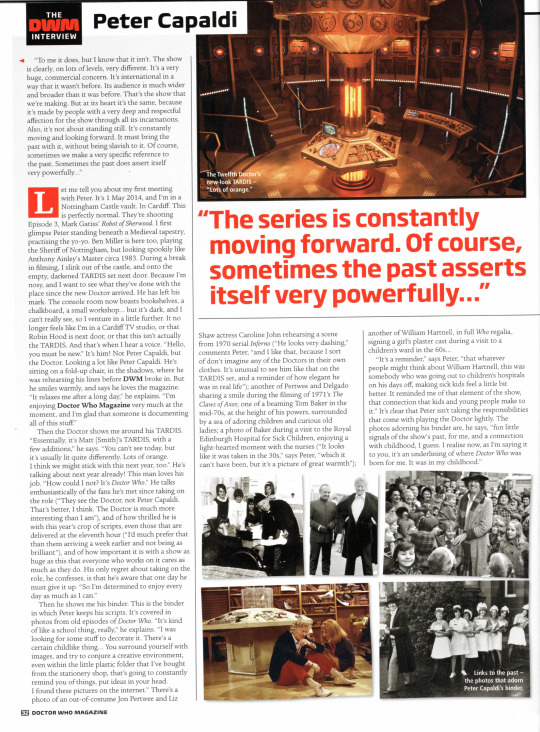
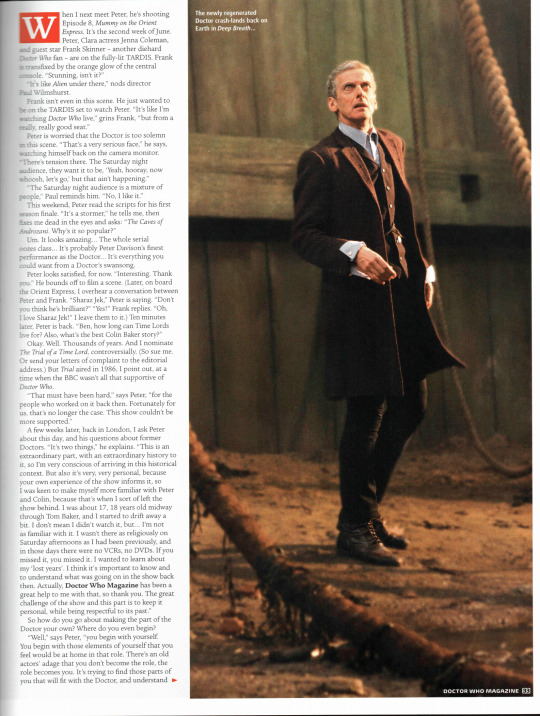
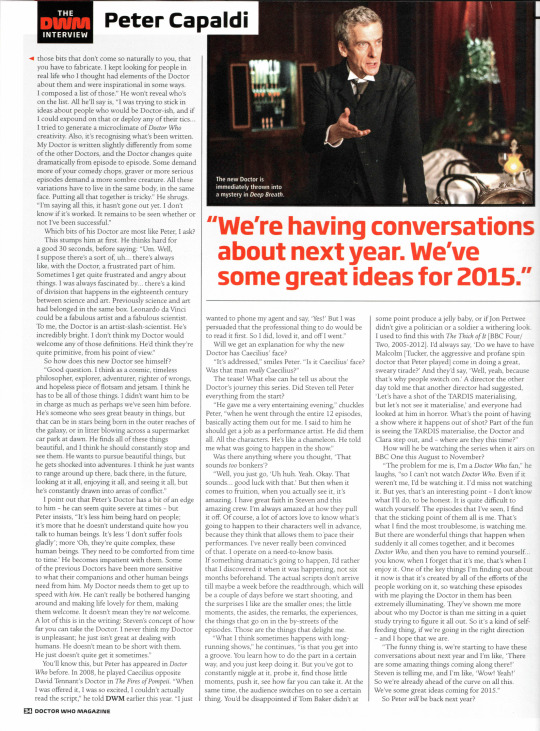
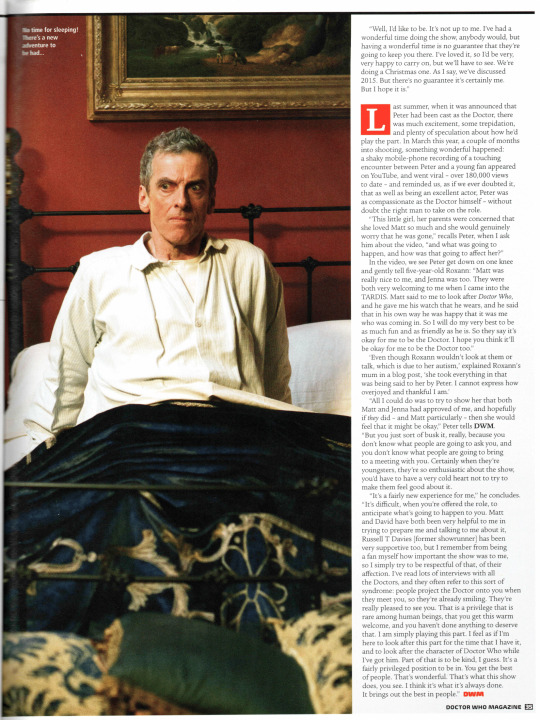
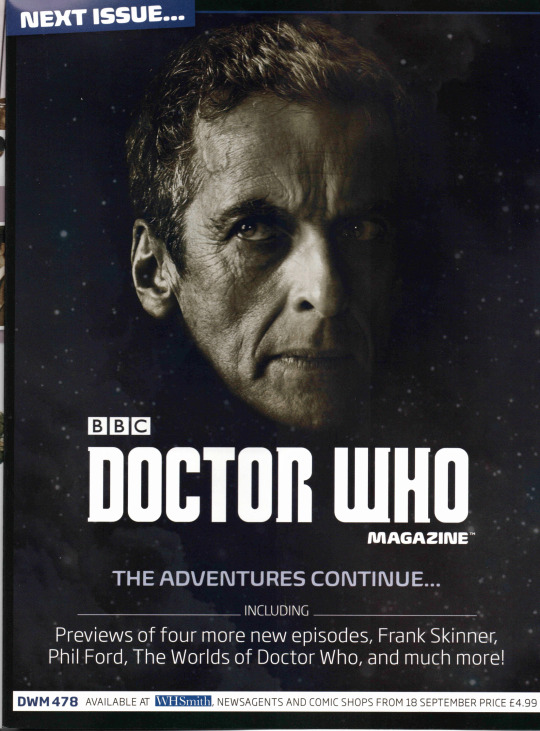
INTERVIEW
Doctor Who Magazine
October 2014
"The Doctor sees himself as a cosmic, timeless philosopher, an explorer, adventurer, righter of wrongs, and hopeless piece of flotsam and jetsam. I think he has to be all of those things..."
Simple, stark, and back to basics. No frills, no scarf, no messing. Just 100% rebel Time Lord. The Twelfth Doctor is in the building...
Interview by Benjamin Cook
[transcript under the cut]
Peter Capaldi is cool. This time last year, bow ties were cool, and fezzes, or Stetsons, possibly bunk beds. But now it’s the Doctor himself. Cool and composed, still never cruel or cowardly, and just the right amount of scary. If you’re anxious about this new, unfamiliar Doctor bursting onto our screens this month in his first, feature-length adventure, don’t be. Firstly, he’s brilliant. Secondly, you’re not alone. Because beneath his cool, unflappable exterior, 56-year old Peter is anxious too.
“I’m terrified,” he admits. “I have been since the very first day. At the first readthrough, there were so many people, the room was packed, you’re being filmed from the moment you step through the door. You think, ‘Oh God, I’ve got to do something good with the part now.’ When I got to film it, I was very frightened. I still am. It’s actually getting a bit more frightening now, because the show is coming on shortly. You’re in a bubble when you’re making it, because it’s so all-consuming. You sort of forget that it’s going out into the world, people are going to have opinions about it, and it’s going to work or it’s not. Once all that enters your head, you get scared all over again. You know? It’s a big challenge, because it’s sort of not about acting chops; it’s about whether or not the people like you, and there’s no guarantee of that. But you can’t spend every day terrified or you’d never get anything done - it’s not much use to you, if you’re on edge – so you sort of have to just not look down. You have to try to get on with that scene, with those words, coming through that door, running after that monster. Concentrate on those elements, and not on the bigger picture. The Doctor is rarely that frightened.” A pause. “I think it’s good to be frightened.” He mulls this over, before adding: “But also it’s delightful.”
It's well documented that Peter is a fan of Doctor Who. You’ll have read the letter he wrote, as a teenager, to Radio Times, lamenting the death of original Master actor Roger Delgado and applauding a recent article on how to build a Dalek. (‘Who knows, the country could be invaded by an army of school Daleks,’ wrote 15-year-old Peter. ‘Ah, but we’d be safe, as we’d have Dr Who to protect us!’) You’ll know that he collected the Doctors’ autographs, wrote fan fiction, drew fan art, and once interviewed Bernard Lodge, the designer of the show’s original title sequence, for a Doctor Who fanzine. You might even know that Peter was involved in the early days of organized fandom, and penned numerous letters to the Doctor Who production office inquiring about how the show was made. One time, producer Barry Letts wrote back, sending Peter two shooting scripts for 1972 Pertwee serial The Mutants, “a trigger to my ambition to work somehow – I didn’t know how – in TV,” Peter has said.
Which makes it all the more satisfying that forty-something years later, on a blisteringly hot Saturday afternoon in July 2014, Peter is stood on the steps of St Paul’s Cathedral – the real one in London, not, as showrunner Steven Moffat teases, "an exact replica that we’ve built in Cardiff” – shooting the two-part finale of his first series as the Doctor. He still can’t quite believe it. “I’m amazed,” he tells DWM, “to find myself close to the end now. It’s all gone very quickly.”
Stood next to Peter, fellow Glaswegian Michelle Gomez is all Edwardian and chic – and probably up to no good – as the intriguingly-titled Gatekeeper of the Nethersphere. A passing London cabbie rolls down his window and yells, “It’s Doctor Who and Mary Poppins!”
Peter starts to sing. “Feed the birds, tuppence a bag…”
Off camera, five Cybermen lurk. They’re not joining in. (Cybermen can’t sing.) They were last spotted stomping around St Palu’s in the 1968 serial The Invasion, which Peter watched on its original airing. Of course he did. “It’s great to recreate it today,” he says. “Although, I think they had more Cybermen back then.”
“But we can CGI in extra ones,” points out Steven. “And will! Come on, it’s pretty impressive.” He’s right, it is. As the Cybermen march down the cathedral steps, Peter takes photos on his mobile phone. “It’s terrifying when they come straight at you,” marvels Steven. “They look quite funny on the stairs, but then - uh oh!”
For the past six months, Peter has divided his time between his home in London, and Cardiff, the spiritual home of twenty-first century Doctor Who. He saves the universe Mondays to Fridays, then returns to London at weekends to spend time with his wife and daughter. Peter and his wife have been married for 23 years. Remarkably, he has been reading DWM for even longer. “For as long as I can remember,” he says. See, he’s a proper fan. Right now, a few feet away from us, there are several hundred fellow fans, watching the filming from behind police cordons. “It’s nice for them to have something to see,” Peter says. “The best days are always those where we’re blowing up monsters in broad daylight.” He heads over to meet the fans between virtually every take – signing autographs, posing for photos. His dedication is relentless. This man cares.
What was it that first attracted Peter to Doctor Who? Growing up in the 1960s in Glasgow, BBC TV Centre must have seemed a world away…
“Well, yes, regional accents were few and far between on television,” he remembers. “That’s how shows were. That’s how drama and entertainment was presented. But it absolutely didn’t feel a world away. It’s odd now when you think about it, as most drama then was London-centric, but we didn’t think about that. It was full of monsters, and creatures, and mystery, and darkness, and fun, and magic. Anybody who enjoyed the show had a very intimate relationship with it, so it never occurred to me for a second where it was made. It didn’t feel as though we were watching different people, other than when they were supposed to be not human. People have often asked me, since I took up the role, what the attraction is, and I find almost any answer is wanting. You can break it down into constituent events or psychoanalytical nuggets, but in the end it’s a sort of myth to me; a curious mix of sci-fi, and the fairytale, and the mysterious. It’s quite a darkly magical thing, I think. I like to keep it a mystery.
Does it feel like the same show he’s working on now?
“To me it does, but I know that it isn’t. The show is clearly, on lots of levels, very different. It’s a very huge, commercial concern. It’s international in a way that it wasn’t before. That’s the show that we’re making. But at its heart it’s the same, because it’s made by people with a very deep and respectful affection for the show through all its incarnations. Also, it’s not about standing still. It’s constantly moving and looking forward. It must bring the past with it, without being slavish to it. Of course, sometimes we make a very specific reference to the past. Sometimes the past does assert itself very powerfully…”
Let me tell you about my first meeting with Peter. It’s 1 May 2014, and I’m in a Nottingham Castle vault. In Cardiff. This is perfectly normal. They’re shooting Episode 3, Mark Gatiss’ Robot of Sherwood. I first glimpse Peter standing beneath a Medieval tapestry, practicing the yo-yo. Ben Miller is here too, playing the Sheriff of Nottingham, but looking spookily like Anthony Ainley’s Master circa 1983. During a break in filming, I slink out of the castle, and onto the empty, darkened TARDIS set next door. Because I’m nosy, and I want to see what they’ve done with the place since the new Doctor arrived. He has left his mark. The console room now boasts bookshelves, a chalkboard, a small workshop… but it’s dark and I can’t really see, so I venture in a little further. It no longer feels like I’m in a Cardiff TV studio or that Robin Hood is next door, or that this isn’t actually the TARDIS. And that’s when I hear a voice. “Hello, you must be new.” It’s him! Not Peter Capaldi, but the Doctor. Looking a lot like Peter Capaldi. He’s sitting on a fold-up chair, in the shadows, where he was rehearsing his lines before DWM broke in. But he smiles warmly, and says he loves the magazine. “It relaxes me after a long day,” he explains. “I’m enjoying Doctor Who Magazine very much at the moment, and I’m glad that someone is documenting all of this stuff.”
Then the Doctor shows me around his TARDIS. “Essentially, it’s Matt [Smith]’s TARDIS, with a few additions,” he says. “You can’t see today, but it’s usually lit quite differently. Lots of orange. I think we might stick with this next year, too.” He’s talking about next year already! This man loves his job. “How could I not? It’s Doctor Who.” He talks enthusiastically of the fans he’s met since taking on the role (“They see the Doctor, not Peter Capaldi. That’s better, I think. The Doctor is much more interesting than I am”), and of how thrilled he is with this year’s crop of scripts, even those that are delivered at the eleventh hour (“I’d much prefer that than them arriving a week earlier and not being as brilliant”), and of how important it is with a show as huge as this that everyone who works on it cares as much as they do. His only regret about taking on the role, he confesses, is that he’s aware that one day he must give it up. “So I’m determined to enjoy every day as much as I can.”
Then he shows me his binder. This is the binder in which Peter keeps his scripts. It’s covered in photos from old episodes of Doctor Who. “It’s kind of like a school thing, really,” he explains. “I was looking for some stuff to decorate it. There’s a certain childlike thing… You surround yourself with images, and try to conjure a creative environment, even within the little plastic folder that I’ve bought from the stationary shop, that’s going to constantly remind you of things, put ideas in your head. I found these pictures on the internet.” There’s a photo of an out-of-costume Jon Pertwee and Liz Shaw actress Caroline John rehearsing a scene from 1970 serial Inferno (“He looks very dashing,” comments Peter, “and I like that, because I sort of don’t imagine any of the Doctors in their own clothes. It’s unusual to see him like that on the TARDIS set, and a reminder of how elegant he was in real life”); another of Pertwee and Delgado sharing a smile during the filming of 1971’s The Claws of Axos; one of a beaming Tom Baker in the mid-70s, at the height of his powers, surrounded by a sea of adoring children and curious old ladies; a photo of Baker during a visit to the Royal Edinburgh Hospital for Sick Children, enjoying a light-hearted moment with the nurses (“It looks like it was taken in the 30s,” says Peter, “which it can’t have been but it’s a picture of great warmth”); another of William Hartnell, in full Who regalia, signing a girl’s plaster cast during a visit to a children’s ward in the 60s…
“It’s a reminder,” says Peter, “that whatever people might think about William Hartnell, this was somebody who was going out to children’s hospitals on his days off, making sick kids feel a little bit better. It reminded me of that element of the show, that connection that kids and young people make to it.” It’s clear that Peter isn’t taking the responsibilities that come with playing the Doctor lightly. The photos adorning his binder are, he says, “fun little signals of the show’s past, for me, and a connection with childhood, I guess. I realise now, as I’m saying it to you, it’s an underlining of where Doctor Who was born for me. It was my childhood.”
When I next meet Peter, he’s shooting Episode 8, Mummy on the Orient Express. It’s the second week of June. Peter, Clara actress Jenna Coleman, and guest star Frank Skinner – another diehard Doctor Who fan – are on the fully-lit TARDIS. Frank is transfixed by the orange glow of the central console. “Stunning, isn’t it?”
“It’s like Alien under there,” nods director Paul Wilmshurst.
Frank isn’t even in this scene. He just wanted to be on the TARDIS set to watch Peter. “It’s like I’m watching Doctor Who live,” grins Frank, “but from a really, really good seat.”
Peter is worried that the Doctor is too solemn in this scene. “That’s a very serious face,” he says, watching himself back on the camera monitor. “There’s tension there. The Saturday night audience, they want it to be, ‘Yeah, hooray, now whoosh, let’s go,’ but that ain’t happening.”
“The Saturday night audience is a mixture of people,” Paul reminds him. “No, I like it.”
This weekend, Peter read the scripts for his first season finale. “It’s a stormer,” he tells me, then fixes me dead in the eyes and asks: “The Caves of Androzani. Why’s it so popular?”
Um. It looks amazing… The whole serial oozes class… It’s probably Peter Davison’s finest performance as the Doctor… It’s everything you could want from a Doctor’s swansong.
Peter looks satisfied, for now. “Interesting. Thank you.” He bounds off to film a scene. (Later, on board the Orient Express, I overhear a conversation between Peter and Frank. “Sharaz Jek,” Peter is saying. “Don’t you think he’s brilliant?” “Yes!” Frank replies. “Oh, I love Sharaz Jek!” I leave them to it.) Ten minutes later, Peter is back. “Ben, how long can Time Lords live for? Also, what’s the best Colin Baker story?”
Okay. Weill. Thousands of years. And I nominate The Trial of a Time Lord, controversially. (So sue me. Or send your letters of complaint to the editorial address.) But Trial aired in 1986, I point out, at a time when the BBC wasn’t all that supportive of Doctor Who.
“That must have been hard,” says Peter, “for the people who worked on it back then. Fortunately for us, that’s no longer the case. This show couldn’t be more supported.”
A few weeks later, back in London, I ask Peter about this day, and his questions about former Doctors. “It’s two things,” he explains. “This is an extraordinary part, with an extraordinary history to it, so I’m very conscious of arriving in this historical context. But also it’s very, very personal, because your own experience of the show informs it, so I was keen to make myself more familiar with Peter and Colin, because that’s when I sort of left the show behind. I was about 17, 18 years old midway through Tom Baker, and I started to drift away a bit. I don’t mean I didn’t watch it, but… I’m not as familiar with it. I wasn’t there as religiously on Saturday afternoons as I had been previously, and in those days there were no VCRs, no DVDs. If you missed it, you missed it. I wanted to learn about my ‘lost years’. I think it’s important to know and to understand what was going on in the show back then. Actually, Doctor Who Magazine has been a great help to me with that, so thank you. The great challenge of the show and this part is to keep it personal, while being respectful to its past.”
So how do you go about making the part of the Doctor your own? Where do you even begin?
“Well,” says Peter, “you begin with yourself. You begin with those elements of yourself that you feel would be at home in that role. There’s an old actors’ adage that you don’t become the role, the role becomes you. It’s trying to find those parts of you that will fit with the Doctor, and understand those bits that don’t come so naturally to you, that you have to fabricate. I kept looking for people in real life who I thought had elements of the Doctor about them and were inspirational in some ways. I composed a list of those.” He won’t reveal who’s on the list. All he’ll say is, “I was trying to stick in ideas about people who would be Doctor-ish and if I could expound on that or deploy any of their tics… I tried to generate a microclimate of Doctor Who creativity. Also, it’s recognising what’s been written. My Doctor is written slightly differently from some of the other Doctors, and the Doctor changes quite dramatically from episode to episode. Some demand more of your comedy chops, graver or more serious episodes demand a more sombre creature. All these variations have to live in the same body, in the same face. Putting all that together is tricky.” He shrugs. “I’m saying all this, it hasn’t gone out yet. I don’t know if it’s worked. It remains to be seen whether or not I’ve been successful.”
Which bits of his Doctor are most like Peter, I ask?
This stumps him at first. He thinks hard for a good 30 seconds, before saying: “Um. Well, I suppose there’s a sort of, uh… there’s a kind of division that happens in the eighteenth century between science and art. Previously science and art had belonged in the same box. Leonardo da Vinci could be a fabulous artist and a fabulous scientist. To me, the Doctor is an artist-slash-scientist. He’s incredibly bright. I don’t think my Doctor would welcome any of those definitions. He’d think they’re quite primitive, from his point of view.”
So how does this new Doctor see himself?
“Good question. I think as a cosmic, timeless philosopher, explorer, adventurer, righter of wrongs, and hopeless piece of flotsam and jetsam. I think he has to be all of those things. I didn’t want him to be in charge as much as perhaps we’ve seen him before. He’s someone who sees great beauty in things, but that can be in stars being born in the outer reaches of the galaxy, or in litter blowing across a supermarket car park at dawn. He finds all of these things beautiful, and I think he should constantly stop and see them. He wants to pursue beautiful things, but he gets shocked into adventures. I think he just wants to range around up there, back there, in the future, looking at it all, enjoying it all, and seeing it all, but he’s constantly drawn into areas of conflict.”
I point out that Peter’s Doctor has a bit of an edge to him – he can seem quite severe at times – but Peter insists, “It’s less him being hard on people; it’s more that he doesn’t understand quite how you talk to human beings. It’s less ‘I don’t suffer fools gladly’; more ‘Oh, they’re quite complex, these human beings. They need to be comforted from time to time.’ He becomes impatient with them. Some of the previous Doctors have been more sensitive to what their companions and other human beings need from him. My Doctor needs them to get up to speed with him. He can’t really be bothered hanging around and making life lovely for them, making them welcome. It doesn’t mean they’re not welcome. A lot of this is in the writing: Steven’s concept of how far you can take the Doctor. I never think my Doctor is unpleasant; he just isn’t great at dealing with humans. He doesn’t mean to be short with them. He just doesn’t quite get it sometimes.”
You’ll know this, but Peter has appeared in Doctor Who before. In 2008, he played Caecilius opposite David Tennant’s Doctor in The Fires of Pompeii. “When I was offered it, I was so excited, I couldn’t actually read the script,” he told DWM earlier this year. “I just wanted to phone my agent and say, ‘Yes!’ But I was persuaded that the professional thing to do would be to read it first. So I did, loved it, and off I went.”
Will we get an explanation for why the new Doctor has Caecilius’ face?
“It’s addressed,” smiles Peter. “Is it Caecilius’ face? Was that man really Caecilius?”
The tease! What else can he tell us about the Doctor’s journey this series. Did Steven tell Peter everything from the start?
“He gave me a very entertaining evening,” chuckles Peter, “when he went through the entire 12 episodes, basically acting them out for me. I said to him he should get a job as a performance artist. He did them all. All the characters. He’s like a chameleon. He told me what was going to happen in the show.”
Was there anything where you thought, ‘That sounds too bonkers’?
“Well, you just go, ‘Uh huh. Yeah. Okay. That sounds…. good luck with that.’ But then it comes to fruition, when you actually see it, it’s amazing. I have great faith in Steven and this amazing crew. I’m always amazed at how they pull it off. Of course, a lot of actors love to know what’s going to happen to their characters well in advance, because they think that allows them to pace their performances. I’ve never really been convinced of that. I operate on a need-to-know basis. If something dramatic’s going to happen, I’d rather that I discovered it when it was happening, not six months beforehand. The actual scripts don’t arrive till maybe a week before the readthrough, which will be a couple of days before we start shooting, and the surprises I like are the smaller ones; the little moments, the asides, the remarks, the experiences, the things that go on in the by-streets of the episodes. Those are the things that delight me.
“What I think sometimes happens with long-running shows,” he continues, “is that you get into a groove. You learn how to do the part in a certain way, and you just keep doing it. But you’ve got to constantly niggle it, probe it, find out those little moments, push it, see how far you can take it. At the same time, the audience switches on to see a certain thing. You’d be disappointed if Tom Baker didn’t at some point produce a jelly baby, or if Jon Pertwee didn’t give a politician or a soldier a withering look. I used to find this with The Thick of It [BBC Four/Two, 2005-2012]. I’d always say ‘Do we have to have Malcolm [Tucker, the aggressive and profane spin doctor that Peter played] come in doing a great, sweary tirade?' And they’d say, ‘Well, yeah, because that’s why people switch on.’ A director the other day told me that another director had suggested, ‘Let’s have a shot of the TARDIS materialising, but let’s not see it materialise,’ and everyone had looked at him in horror. What’s the point of having a show where it happens out of shot? Part of the fun is seeing the TARDIS materialise, the Doctor and Clara step out, and – where are they this time?”
How will he be watching the series when it airs on BBC One this August to November?
“The problem for me is, I’m a Doctor Who fan,” he laughs, “so I can’t not watch Doctor Who. Even if it weren’t me, I’d be watching it. I’d miss not watching it. But yes, that’s an interesting point – I don’t know what I’ll do, to be honest. It is quite difficult to watch yourself. The episodes that I’ve seen, I find that the sticking point of them all is me. That’s what I find the most troublesome, is watching me. But there are wonderful things that happen when suddenly it all comes together, and it becomes Doctor Who, and then you have to remind yourself… you know, when I forget that it’s me, that’s when I enjoy it. One of the key things I’m finding out about it now is that it’s created by all of the efforts of the people working on it, so watching these episodes with me playing the Doctor in them, has been extremely illuminating. They’ve shown me more about who my Doctor is than me sitting in a quiet study trying to figure it all out. So it’s a kind of self-feeding thing, if we’re going in the right direction – and I hope that we are.
“The funny thing is, we’re starting to have these conversations about next year and I’m like ‘There are some amazing things coming along there!’ Steven is telling me, and I’m like, ‘Wow! Yeah!’ So we’re already ahead of the curve on all this. We’ve some great ideas coming for 2015.”
So Peter will be back next year?
“Well, I’d like to be. It’s not up to me. I’ve had a wonderful time doing the show, anybody would, but having a wonderful time is no guarantee that they’re going to keep you there. I’ve loved it, so I’d be very, very happy to carry on, but we’ll have to see. We’re doing a Christmas one. As I say, we’ve discussed 2015. But there’ s no guarantee it’s certainly me. But I hope it is.”
Last summer, when it was announced that Peter had been cast as the Doctor, there was much excitement, some trepidation, and plenty of speculation about how he’d play the part. In March this year, a couple of months into shooting, something wonderful happened: a shaky mobile-phone recording of a touching encounter between Peter and a young fan appeared on YouTube, and went viral – over 180,000 views to date – and reminded us, as if we ever doubted it, that as well as being an excellent actor, Peter was as compassionate as the Doctor himself – without doubt the right man to take on the role.
“This little girl, her parents were concerned that she loved Matt so much and she would genuinely worry that he was gone,” recalls Peter, when I ask him about the video, “and what was going to happen, and how was that going to affect her?”
In the video, we see Peter get down on one knee and gently tell five-year-old Roxann: “Matt was really nice to me, and Jenna was too. They were both very welcoming to me when I came into the TARDIS. Matt said to me to look after Doctor Who, and he gave me his watch that he wears, and he said that in his own way he was happy that it was me who was coming in. So I will do my very best to be as much fun and as friendly as he is. So they say it’s okay for me to be the Doctor. I hope you think it’ll be okay for me to be the Doctor, too.”
‘Even though Roxann wouldn’t look at them or talk, which is due to her autism,’ explained Roxann’s mum in a blog post, ‘she took everything in that was being said to her by Peter. I cannot express how overjoyed and thankful I am.’
“All I could do was to try to show her that both Matt and Jenna had approved of me, and hopefully if they did – and Matt particularly – then she would feel that it might be okay,” Peter tells DWM.
“But you just sort of busk it, really, because you don’t know what people are going to ask you, and you don’t know what people are going to bring to a meeting with you. Certainly when they’re youngsters, they’re so enthusiastic about the show, you’d have to have a very cold heart not to try to make them feel good about it.
“It’s a fairly new experience for me,” he concludes. “it’s difficult, when you’re offered the role, to anticipate what’s going to happen to you. Matt and David have both been very helpful to me in trying to prepare me and talking to me about it, Russel T Davies [former showrunner] has been very supportive too, but I remember from being a fan myself how important the show was to me, so I simply try to be respectful of that, of their affection. I’ve read lots of interviews with all the Doctors, and they often refer to this sort syndrome: people project the Doctor onto you when they meet you, so they’re already smiling. They’re really pleased to see you. That’s a privilege that is rare among human beings, that you get this warm welcome, and you haven’t done anything to deserve that. I am simply playing this part for the time that I have it, and to look after the character of Doctor Who while I’ve got him. Part of that is to be kind, I guess. It’s a fairly privileged position to be in. You get the best of people. That’s wonderful. That’s what this show does you see. I think it’s what it’s always done. It brings out the best in people.
61 notes
·
View notes
Text
i watched joy to the world and apart from the fact that it was cheesy in a kinda bad way (*cough* disney coded *cough*), although i understand all the anita love (only saving grace of the episode imo), there are a lot of things that bothered me with this episode. one of them is the fact that steven moffat always needs to explain to us in detail just how clever he is.
that scene where the doctor gets joy angry, and tells her she's a "sad sack of a human being" for sleeping in the loneliest, saddest hotel room in the world, and you, as a viewer, know damn well that that's exactly what the doctor did for a year... well, that's pretty self-explanatory, isn't it?
but moffat apparently thinks that we're stupid. needed to have joy explain it to the doctor (and therefore to us) at the end of the episode. what happened to show not tell?
the problem with the doctor has never been that he doesn't realize everything that's wrong with himself. it's always been that he does, in fact, know perfectly well what's wrong with himself but doesn't do anything about it.
he totally knows that he's projecting onto joy. he knows he shouldn't be alone. donna, amy, anita etc all told him that, and ten even acknowledged it after waters of mars when he was talking to wilfred: "i'm travelling alone. i thought it was better. but i did some things, it went wrong. i need..." he needs a companion. he knows.
so for moffat to have joy explain the irony to us? insulting. we didn't swing out of a tree yesterday, this show is 20 years old! and if you go further back, 60 years old!
so yeah, welcome back, moffat. so far, the two episodes he wrote were my least favourite (all the one off characters from boom can honestly die idc)
also anita could have easily been the new companion but eh, can't have that can we? a 30+ year old companion?? pffft keep dreaming. this is moffat we're talking about.
still, let's hope they pull a donna and bring her back if there's a series 16
#doctor who#dw#doctor who meta#dw meta#anti steven moffat#anti moffat#joy to the world#fifteenth doctor#15th doctor#pro russell t davies#anita benn
36 notes
·
View notes
Text
SHERLOCK DID CHOOSE THE RIGHT PILL. STEVEN SAID SO
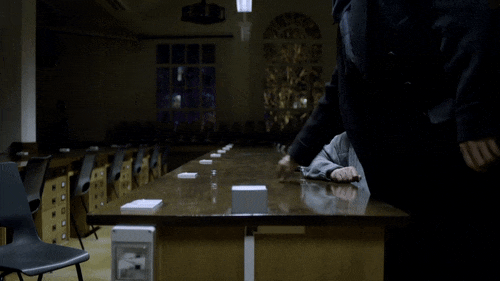
After rewatching ASIP again today, I think I might have finally discovered the truth about if Sherlock has chosen the correct pill.
The answer is YES.
I will save you time and tell you right here right now that the truth lies simply in how certain shots were particularly framed. However, if you do wish to discover the Why, then here is the other end of the handcuffs, be my most welcomed guest.
Let me start with a notice that I am as well aware as I can be that A LOT of people have already analyzed this mystery countless times from every possible angle. And while I remain confident in “The Princess Bride Theory” and am sure it's still the most possible solution (given the impossible odds), it might not be the case in Sherlock's situation. Here are two possibilities:
According to Mr Cabbie (Jefferson Hope), Sherlock's "fan" / his sponsor (later revealed to be Moriarty) has warned him about Sherlock in advance:
SHERLOCK: How did you find me?
JEFF: Oh, I recognised yer, soon as I saw you chasing my cab. Sherlock ’olmes! I was warned about you. I’ve been on your website, too. Brilliant stuff! Loved it!
SHERLOCK: Who warned you about me?
JEFF: Just someone out there who’s noticed you.
Now, Mr Cabbie’s kids get money every time their dad murders someone, yes, but since Moriarty has particularly warned Hope about Sherlock instead of warning him OFF Sherlock, it could be possible that the pay would be higher if Hope succeeds in murdering Sherlock. (But also given that Moriarty was much more interested in making Sherlock dance rather than killing him, this assumption is very likely wrong)
The second possibility is that could it be for both types of pills to be harmless to Hope (with his aneurysm), and only one of them deadly to the victims? (This hypothesis is also very unlikely, due to the fact that Hope did not have a real gun and was unlikely capable of strangling full-grown adults to death with his hands if they’ve actually chosen the harmless pill)
Thus, in this meta we are temporarily abandoning The Princess Bride Theory, assuming that there actually were a good pill and a bad pill for Hope as well, and focus entirely on the framing.
[I watched Ben’s new TV series ERIC a month ago and was astonished to realize that I was able to pick up on hidden messages so rapidly during the show. (Really recommend it! And if you’re into interpreting intricate movies as well, definitely watch The Power of the Dog too! I like it so much I am currently reading the novel.) A huge thanks to all you clever clever TJLCers, for that if it wasn’t for you and TJLC I would never have developed this ability at all to write this short meta.]
The key idea is to constantly ask yourself “Why?”. Why is this shot framed that way? Why did that light go out first? Why is this seemingly unimportant detail included here? Why did this dialogue happen?
Why did Steven Moffat write in the script that Hope chose the building on the right?

If there’s one thing I know for certain, it is that NOTHING in BBC Sherlock is there without a reason. So, why was the right building the “right” one, instead of the left? Does it parallel how the two bottles of pills were placed on the table? If we make the assumption that Right is correct and Left is wrong, is there any other evidence to support it?
YES.
1. The pills

WHY is it that EVERY TIME the two pill bottles were given close up shots side by side, it was ALWAYS the one on Hope’s right in focus?
2. The doors


WHY is it that Sherlock and Hope entered through the right side of the door in the right building, and John ran through the left side of the door in the left/wrong building?

WHY is it that John burst through the right side of the door AFTER Sherlock has chosen the pill on the right?
3. The positions


WHY is it that Sherlock was ALWAYS on the left side of the frame and Hope the right without ANY exceptions?

WHY is it that they switched positions AT ONCE, the moment Sherlock chose the pill on the right? (Also note that Sherlock held his pill in his right hand and Hope his left)
Why Why Why?
If it’s just once or twice, we could still dismiss them as “coincidences”. (What did we say about coincidence?) But this many? Implicated in such platent ways? I was an absolute idiot for not seeing this sooner.
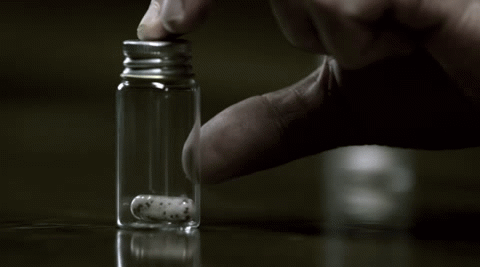
If every single shot implies that right is Right and left is Wrong, Hope slid the pill on the left to Sherlock, and Sherlock chose the one originally on the right, is there any possibility that he chose the wrong one?
NOT. A. CHANCE.
All screencaps taken from here.
(I really wanted to tag someone but sadly I don’t know any of you wonderful people and it feels terribly intrusive and impolite to tag someone you don’t know :( Please definitely let me know if you wish to be tagged and thank you so much for coming to my ted talk.)
#MYSTERY SOLVED#steven you sneaky little#I was so blind#how could I’ve possibly missed this all this time??#bbc sherlock#sherlock bbc#sherlock#sherlock s1#a study in pink#asip#tjlc#sherlock holmes#john watson#johnlock#sherlock meta#my meta#buckingham-ashtray
69 notes
·
View notes
Note
☕how the writers delt with river song
SCREAMING CRYING THROWING UP THEY DID MY GIRL SO DIRTY there are so many. good river song moments. and there are so manythat make me want to tear a strip off steven moffat like every goddamn episode with her they have to make some obnoxious sex joke or some Honey Im Home type shit & i understand this is like. A Moffat Theme & i dont always hate it but goddddd its so reductive like there is so much!!!! that could be done with her character !!!!!!!!!!!!!!! that is overshadowed by haha what if she was sexy like STOPPPPPPPPPPPP.
like silence in the library was a really good character lead in & i like her!!! as a character !!!! even the overly flirtatiousness unfortunately that would work on me but even aside from that. she is a good character let down but the sheer pull-it-out-of-your-ass writing of her backstory. like?? she could regenerate cos she was conceived in the tardis okay thats really cool much weirder stuff has happened when it comes to tardises & making babies but then WE SeE THIS FOR LIKE. ONE OR TWO EPISODES BEFORE THEYRE LIKE WHOOPS THAT DOESNT WORK ACTUALLY COS SHE'S DEAD UHHH SHE BETTER UHMM IDK SAVE TH E DOCTOR OR SOMETHING WHATEVER> COS HER ENTIRE LIFE HAS TO REVOLVE AROUND HIM. HASHTAG MARRIAGE AMIRITE like even the fact that her entire life was shaped around him isnt a Bad Idea it just feels like no one considered the tragic impies (implications) of this, & simultaneously doing amy so dirty in the process as well like??? she loses baby mels & then discovers she was her (never previously mentioned) childhood friend but then she uhhhh dies & turns into this woman you already know and them????? barely eveer mention it again???? holy shit?????????????????????? amy & river is a freaking horror story but one that the writers seem imcapable of dealing with because sOMEONE is too busy making obnoxious jokes about married life
a lot of thsi is specific to the General Vibes of the eleven era stuff as well which was in general so so weird about women & while its not like twelve or any of teh other doctors are expemt from this eleven is a massive dick to people quite a bit & a lot of this falls on river b/c he is seemingly (iirc i havent seen some of this stuff for a while though it Haunts Me) almost careless? with her? like a sort of 'welllllll she's here now so it was all okay in the end :)' sort of attitude ignoring that she went through A Fuckton Of Stuff before she was even a concious human(mostly??) being
even the husbands of river song is tragically guilty of some of that stuff like. she's seen some wild shit & she should have known it was twelve wayyyyyy way way quicker. like i understand why she didnt for plot reasons but she is in fact very intellegent like. she's allowed to show that. unfortunatley sometimes women cant be smart & have their boobs out at that same time I GUESSSSSSSSS
also the nine & river audios from earlier this year? i really like archipelago i listened to that a couple of times & i thought it was really powerful but AGAIN the writers make river So Fucking Obsessed With Romance like. you'd let it go by that point. nine had literally just proved he's the most aro guy in the universe (good for him) and shes stillllllll flirting at him. which. imo she wouldnt do anymore because, shock horror, she does actually like him as a person & values his company and you would think you would be friends wit hthe guy YOU ARE GONG TO MARRY OR WHATEVER. NOT THAT THEIR MARRIAGE WAS PARTICULARLY ROMANTIC EITHERIM GONNA BE SO REAL. obviously sex is important to her & good for her but yikes. it doesnt need to be mentioned so often.
like its the whole 'inherent tragedy of waiting for a time traveller' stuff which i do eat up every time meeting her in silence of the library & knowong that there is so much more there - VERY COMPELLING !! really good character intro augahagaauuaajaaajahhahahahhhh but nooooo her Entire Fucking Goddman Life has to revolve around being manipulated & The Doctor AS WELL AS !! the completely uncalled for ohhhh im a PSYCHOPATH ( <- unfounded & demonstrably untrue lowkey this is saneism right. thats an ableism there yes? ) thing they alllwaysssss have her say like well!! shes not !! theres 'youre talking about commiting a murder'/'no im not, i'm actually commiting a murder' which i like & is funny & she would say that and then theres teh vauge oooohhhhh im so Freaky & I Have A Gun or whatevr like augsugsaihuahahaouoauauoouauoauoauoauuo
also twelve & river had freaky t4t bi4bi aroallo sex after the end of husbands of river song but no actual dw writer is enlightened enough to see that because they have to flatten her into The Doctors Wife & she would have had a far better dynamic with 12 than with 11 (not that i'm biased) i wish they got more time togetherrrrrrrrrrr also you should listen to the bekdel test (diary of river song audio with missy)
#tldr river song is a character i love very much however she had the grave misfortune of being written in the mid 2010s by steven moffat#anyways. sorry yikes this got long im so sorry i dindt realise i had this much to say. wow#doctor who#thanks for the ask!!#this is not. very flattering of elevens era if are are emotionally attached to him you may want to skip this one <3#jordan tag :D#river song
41 notes
·
View notes
Text
I don't know that I was prepared for just how cynical Boom would be about the state of the world. I mean, it's brilliant, and I love it to bits, this is not a criticism in any way. If The Star Beast was Davies subtweeting Hell Bent's subtweet of Journey's End, Boom is clearly the product of Moffat watching the past eight years and realising that sometimes "Be kind" is an insufficient response to injustice and you need to get a bit angry about it.
It's barbed in a way that we only fleetingly glimpsed in stuff like His Last Vow ("Having problems with Rupert Murdoch? Shoot him in the fucking face") or World Enough and Time/The Doctor Falls ("Pain... pain... pain"). And it's also worth noting that we get the same cynicism about the state of British healthcare that we got in that earlier two-parter, very consciously framed in reference to The Empty Child/The Doctor Dances both in the "killer ambulance" conceit and the constant references to Villengard.
Of course, the ending has a lot of that trademark Moffat sentimentality, but nobody writes it quite like he does so I don't count that as a negative at all. Despite his reputation, Steven Moffat is never going to write an out-and-out embrace of cynicism and nihilism; Moffat could never write Midnight, and Davies could never write Hell Bent.
But there's something heartwarming and not a little fascinating in seeing the two of them trying anyway.
(Credit where credit is due to Gibson and Gatwa, of course. The two of them knock it out of the park. Also a few hours after using the phrase "Robert Holmes would be so proud" in my initial response to Space Babies, El Sandifer's review of the episode ended up using the same phrase. Probably goes without saying but I hadn't read that piece beforehand, and if it was put up on her Patreon before being posted to the Eruditorum Press site, I swear I didn't see it lol.)
102 notes
·
View notes
Text

Steven Moffat has admitted that he intended for Petronella Osgood to be the daughter of Tom Osgood, the UNIT soldier who worked with the Third Doctor.
However, he never stated this explicitly, as he wanted the fans to decide for themselves who she is or could be.
Ingrid Oliver, who plays her, has confirmed she made her own decision as to who survived out of the original Osgood and the Zygon copy.
But she refuses to tell anyone, including Moffat, so "you can make your own mind up."
#doctor who#new doctor who#petronella osgood#osgood#tom osgood#unit hq#kate lethbridge stewart#steven moffat#peter capaldi#third doctor#the zygon invasion
43 notes
·
View notes
Text

Doctor Who: Big Finish, Alex Kingston Team for New River Song Stories
Alex Kingston will return as River Song for a new round of Big Finish's Doctor Who audio dramas set AFTER "Silence in the Library."
Now that Steven Moffat is back writing for Doctor Who, fans are speculating about whether River Song will be back. Alex Kingston certainly hasn't made it a secret that she would love to play the character again. But River Song never really went away. She's been headlining a River Song series in audio dramas from Big Finish for years since she had her final story on Doctor Who. Now she will star in The Death and Life of River Song, a brand-new series of full-cast audio dramas coming soon from Big Finish Productions. It's like a whole new season of River Song adventures – and the latest.
In case you didn't know, River Song is an archaeologist from the 52nd century, born and raised to be an assassin, destined to marry her intended target, and to have many of her own adventures too – Professor River Song's very messy timeline began (or maybe ended) when she first appeared in the 2008 Doctor Who TV episode Silence in the Library. Since then, Kingston has reprised the role in her own series of Doctor Who audio spinoffs, including The Diary of River Song, which ran from 2015 to 2023. Now, in August 2024, she will return in a brand-new series, The Death and Life of River Song.
The first box set in the series, Last Words, is written by Robert Valentine. It begins with River, after settling down to an afterlife in the Library's computer core, finding herself waking up in Earth's future, her consciousness having been temporarily transferred to a new body.
Alex Kingston said that River's stories at Big Finish have moved beyond her death in Doctor Who: "We have gone post-Library! We've done another episode in the past where I was within the database, which I loved, and I thought that's the only way you could go forward with River, given her situation. So, I was actually really surprised when this box set came my way and that we are now so far advanced in the history of Earth that she is able to be brought out as data and put into a cloned body. So very, very clever!"
Producer David Richardson added: "When every single day during the recording, your leading actress says "This script is brilliant," you know you're onto a good thing. Even better, at the end of the last day, Alex popped the script in her bag and announced that she loved Last Words so much she was taking it home to keep and treasure."
The Death and Life of River Song: Last Words is now available for pre-order exclusively here, either as a collector's edition four-CD box set for £29.99 or as a digital download for £22.99 per volume. Big Finish listeners can also pre-order a bundle with Last Words as well as Volumes 2 and 3 of The Death and Life of River Song, which are both due for release in 2025, for just £80 (collector's edition CDs + downloads) or £66 (downloads only). [X]
#I'M SCREAMING BECAUSE WHAT DOES LAST WORD MEAN#Alex Kingston#Doctor Who#River Song#Steven Moffat#Big Finish#2024#I HAVE TRAUMA
78 notes
·
View notes
Text
After finishing Doctor Who during Moffat's run, I think I see a pattern here for most (but not all) of his female characters choices in Doctor Who & Sherlock. I know people have already analyzed this before, but I want to do it myself so here we go.
There are primary three categories:
1. The first is the generic and the normal ones, according to him. Characters like Amy, Donna (silence in the library episode) from Doctor Who, Mary from Sherlock. These are the characters that will always stand with the good people, never straying, and whose life long dream is to settle down and have children. Mary of course is an outlier, because she had shot Sherlock and broke John's trust. But in the final season, it turned out that her hands had been forced, and she had been good all along.
For me, I think wanting to settle down to have a family of course is not necessarily a bad thing. I can't say for Mary and Amy because I couldn't relate to them personally, however, Donna's storyline in the Silence in the Library didn't sit well with me. When she was saved by the Computer, it sort of simulated a life that it thought she wanted. One where she had two beautiful children and a dotting husband. The problem here lies in the fact that she had been ridiculed and thought to be loud and brash and stupid all her life, and had been a temp for a long time. She literally ran to the TARDIS the second time she met the Doctor because she didn't like the life she had had, or the life her mom has been pressuring her to have. Can you see how reluctant she has been to pursue anything really? Do you really think her life-long dream, her secret desire is still to settle down and become a wife to someone? Maybe, but not before taking the chance to see the Universe with the Doctor. I actually have a feeling that finding a husband might have been on her list, but she could be doing that more out of obligation and societal expectations. Again, it's not a bad thing to want a family, but there's a recurring theme for his character choices that I can't help notice.
2. Second are the women who are smart and resourceful. These are the characters that are most of the time portrayed as sexy and intelligent, and most of all above all the others. Characters like Irene Adler and Mary (a little bit) in Sherlock, River and Clara in Doctor Who. I think there are many discussions we can have about the definition of strong, female, characters. However, I agree with many others that these women's lives all revolve around one man. And even if they are smart enough, we have to remember there will be one guy who can still tell them otherwise: which are Sherlock and the Doctor respectively.
3. The third type of women in Steven Moffat's writings are those who are too intelligent they become unpredictable and sometimes downright inhuman. Characters like Eurus in Sherlock, Missy in Doctor Who are in this category. They are extremely smart and morally questionable characters, and certainly, they have a lot of potential to explore. However, they are almost too smart that it becomes harder to relate to them. And since I don't think Moffat really knows how to deal with them, they are either put in a cage when they are being "naughty", or out of the cage at their male counterpart's side when they finally decide to stand with them, to be "good".
By the way, there is one addition that I think is relevant. It is fucking funny that with the way he wrote these women, they are most of the time too put together to really have any story to tell. From first glance, you wouldn't be able to really see what their backgrounds were like and what's on their minds, and as the story progressed nothing really developed. Since this is not good for story telling, he would give you some (in my opinion) unnecessary stories to compensate the lack of substances, such as family drama TM (the whole John and Mary arguments), or the boyfriend drama TM (why didn't you approve my choice of a boyfriend, Doctor? & OMG my boyfriend just been run over by cars because I said "I love you" to him). Those back and forth we didn't really see coming to distract us from the facts. However, this makes a lot of the stories feel disjointed and the time jump between episodes sometimes doesn't make sense. Also when the dramas are added, some audience (normally cis straight guys) can be like look, the main guys don't really care to deal with them and in comparison are way cooler, these girls just needed to be put in their places.
In conclusion, most of the women written by him are either categorized as:
(1) normal girls will -> get pregnant
(2) Smart & sexy powerful women will -> get beaten by the main character (who are always white, more superior and smarter)
(3) Unpredictable brainiacs (who deserve better) will-> get put into dungeons and cages 'cause they are crazy and "bad" (as in their beliefs are not aligned with the hero's). Oh and sometimes they can be sexy, too
#doctor who#sherlock bbc#amy pond#donna noble#mary morstan#irene adler#river song#clara oswald#eurus holmes#missy doctor who#female characters#steven moffat#btw the tenses are whacked here but whatever#my own observations#character study#you can argue that his main focus is still the male characters#but is it so hard to write a more relatable ones#once in a while
28 notes
·
View notes